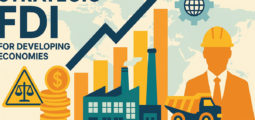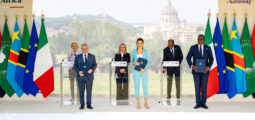[vc_row][vc_column width=”1/2″][vc_column_text]
Chile
Chile was the 40th largest economy in the world by nominal GDP in 2018. Its GDP per capita was $15,923 USD. Chile was the largest copper producer in the world in 2018. It was ranked 45th in the World Bank's Human Capital Index and 61st in the Economic Complexity Index in 2017. It is a member of the regional trading group Mercosur and has been a member of the OECD since 2010. Services was the largest economic sector in 2018 (57.9 percent of GDP), followed by manufacturing (10.6 percent), and agriculture (3.6 percent). In 2017, the largest export sectors were agriculture (30.14 percent), minerals (24.46 percent), metals (22.85 percent), and services (12.29 percent). The largest individual exports were copper ore (20.37 percent), refined copper and copper alloys (18.06 percent), travel and tourism (4.42 percent), ICT services (3.76 percent), and transport services (3.55 percent). Its largest export partners were China (27.48 percent), the USA (14.66 percent), Japan (8.65 percent), and South Korea (5.41 percent). The largest goods imports were refined petroleum (5.95 percent), cars (5.87 percent), and crude oil (4.26 percent). Chile became independent from Spain in 1818 after the country was retaken from Royalists. The economy suffered initially as it transitioned from the colonial system and found new markets. But new discoveries of copper and British technology led to a mining boom, with copper becoming the main export by 1830. In the 1850s, copper and wheat exports drove the economy. the 1880s, nitrate exports became the main driver. Chile was also buoyed by territory gains from Peru and Bolivia in the "War of the Pacific". The economy performed poorly between 1910 and 1940. Institutions were weak, politics was volatile, and the economy suffered several external shocks including the advent of artificial nitrates, World War One and the Great Depression. Between 1950 and 1973, Chile pursued import substitution and industrialisation. The policy helped diversify the economy. In the 1970s massive increases in government spending, not financed by an increase in taxes or debt, and oil price shocks led to hyperinflation. After Pinochet took power in 1973, the country introduced pro-market reforms, large-scale privatisation, and macroeconomic reforms to stabilise the economy and increase growth. Results were modest during the 1980s but by the 1990s the economy was growing at unprecedented levels, and poverty fell. The economy boomed in the 2000s alongside the commodities boom but when prices fell so did growth; growth has been modest since 2014. In October 2019, protests erupted because of rising inequality. In December, the government announced a $5.5bn plan to increase growth and address protestors' concerns.
[/vc_column_text][vc_column_text] Its population in 2018 was 18,197,209 [1]
Its population in 2018 was 18,197,209 [1]
 In 2015, 24.88% of its total energy
In 2015, 24.88% of its total energy
consumption was renewable [2]
 In 2021, its GDP grew by 11.67% [2]
In 2021, its GDP grew by 11.67% [2]
 In 2021 it had a negative Current
In 2021 it had a negative Current
Account Balance of US$bn 21.17 [3]
 Its unemployment rate in 2021 was 8.86% [3]
Its unemployment rate in 2021 was 8.86% [3]
 Its Expenditure on R&D (as a percentage of
Its Expenditure on R&D (as a percentage of
GDP) in 2019 was 0.34% [2]
 A Big Mac will set you back the
A Big Mac will set you back the
local equivalent of US$3.89 [4]
What free trade areas or economic unions is it a member of?
Member of the Comprehensive and Progressive Agreement for Trans-Pacific Partnership (CPTPP) since 30/12/2018
Other members:
Australia, Brunei Darussalam, Canada, Japan, Malaysia, Mexico, New Zealand, Peru, Singapore, Vietnam
What trade deals are there between Comprehensive and Progressive Agreement for Trans-Pacific Partnership and other countries and economic unions?
None
[/vc_column_text][vc_column_text]What trade deals are there with other countries and economic unions?
Protocol on Trade Negotiations (from 11/02/1973)
Canada - Chile free trade agreement (from 05/07/1997)
Chile - Mexico free trade agreement (from 01/08/1999)
Chile - Costa Rica free trade agreement (from 15/02/2002)
Chile - El Salvador free trade agreement (from 01/06/2002)
United States - Chile free trade agreement (from 01/01/2004)
Korea, Republic of - Chile free trade agreement (from 01/04/2004)
EFTA - Chile Free Trade Agreement (from 01/12/2004)
EU - Chile Association Agreement and Additional Protocol (from 01/03/2005)
Trans-Pacific Strategic Economic Partnership (from 28/05/2006)
Chile - China free trade agreement (from 01/10/2006)
Chile - Japan free trade agreement (from 03/09/2007)
Chile - India partial scope agreement (from 11/09/2007)
Panama - Chile free trade agreement (from 07/03/2008)
Chile - Honduras free trade agreement (from 19/07/2008)
Peru - Chile free trade agreement (from 01/03/2009)
Australia - Chile free trade agreement (from 06/03/2009)
Chile - Colombia free trade agreement (from 08/05/2009)
Chile - Guatemala free trade agreement (from 23/03/2010)
Türkiye - Chile free trade agreement (from 01/03/2011)
Chile - Malaysia free trade agreement (from 25/02/2012)
Chile - Nicaragua free trade agreement (from 19/10/2012)
Chile - Viet Nam free trade agreement (from 01/01/2014)
Hong Kong, China - Chile free trade agreement (from 09/10/2014)
Chile - Thailand free trade agreement (from 05/11/2015)
Pacific Alliance free trade agreement (from 01/05/2016)
MERCOSUR - Chile partial scope agreement (from 10/03/2017)
UK - Chile association agreement (from 01/01/2021)
[/vc_column_text][/vc_column][vc_column width=”1/2″][vc_column_text]2012 CFI Top 100 Emerging Markets Companies’ Nominations
Trade with the United Kingdom
Source: UK Office for National Statistics, October 2022.
Contains public sector information licensed under the Open Government Licence v3.0.
Loading, Please Wait!
This may take a second or two.


















































































